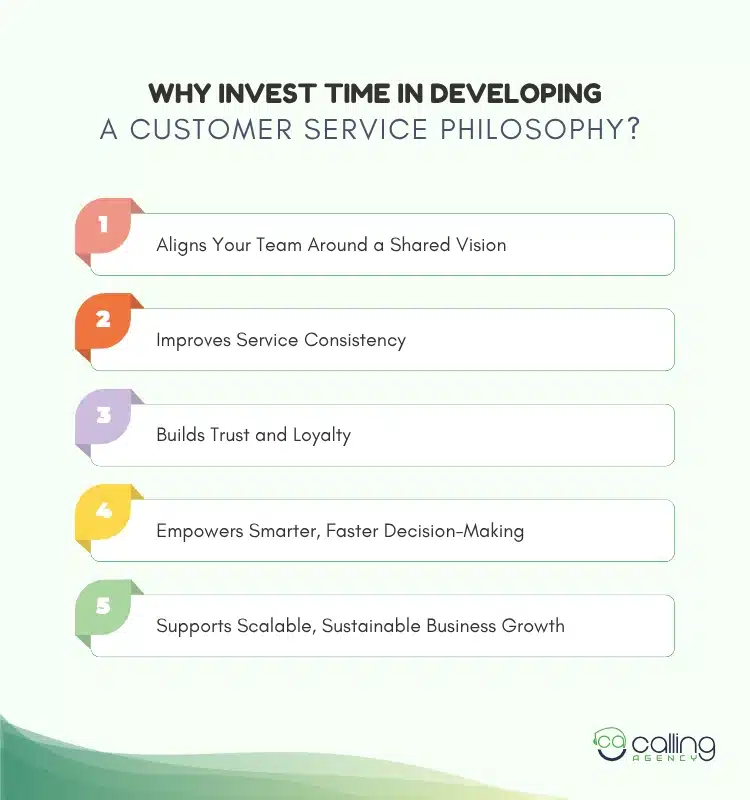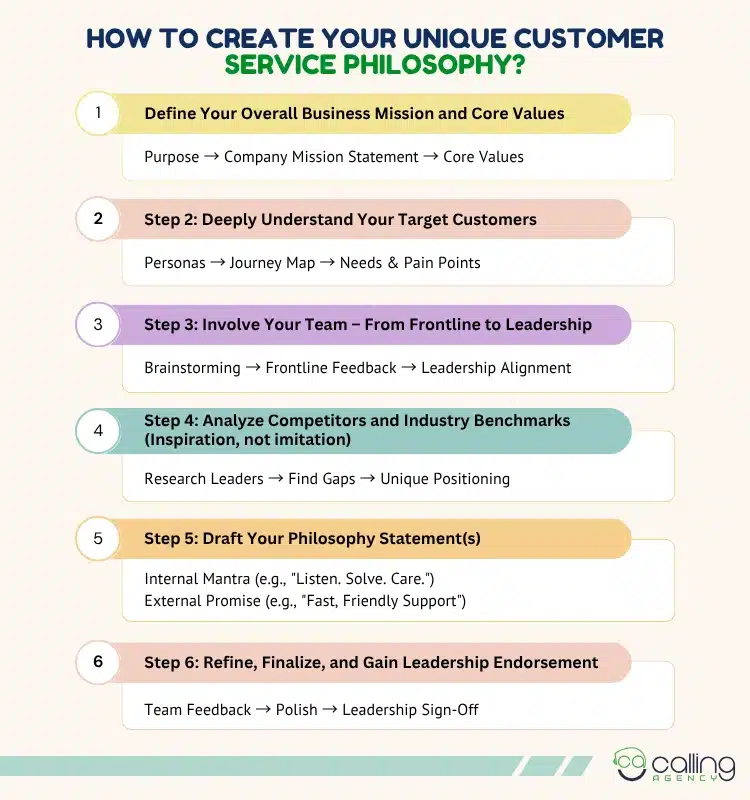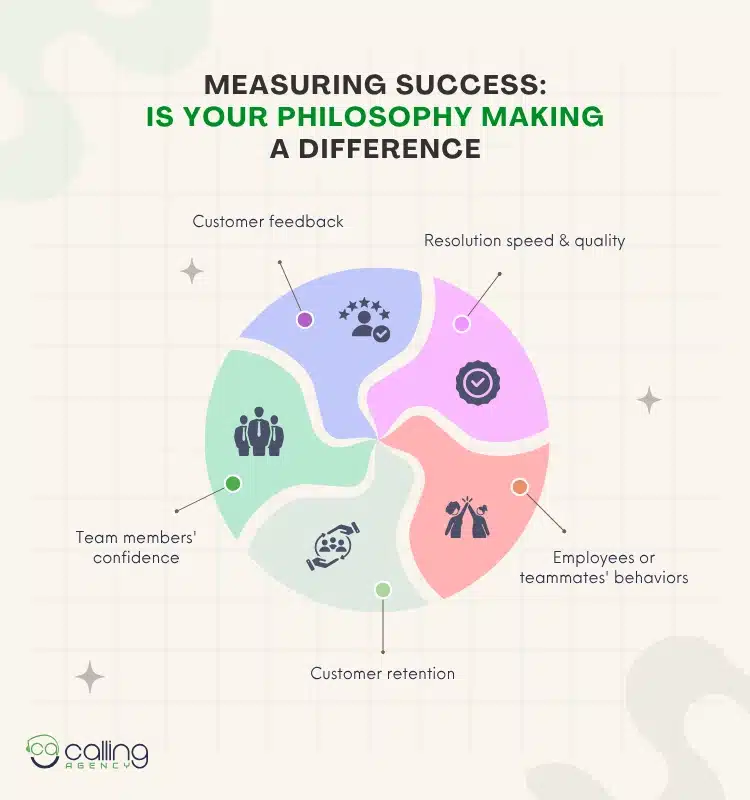It’s no surprise that some brands are so easy to trust — and so easy to come back to. No, they don’t have Aladdin’s magic lamp! The real secret? They have a clear and strong customer service philosophy.
Even this is not just a written document on their websites. It’s the way their team talks to customers, solves problems, and builds loyalty.
“Your brand is what other people say about you when you’re not in the room.” – Jeff Bezos, Amazon.
Today, we’re diving into the details of the customer service philosophy guide. If you’re a business owner, manager, team lead, or HR professional, this customer service philosophy guide is mandatory for you.
Without further ado, let’s dive in.
What is a Customer Service Philosophy?
“Customers don’t expect you to be perfect. They do expect you to fix things when they go wrong.”— Donald Porter, British Airways
A customer service philosophy is nothing but a core part of Customer relationship management. It guides you about how you interact with/approach the customers. Also, it works to build customer loyalty plus improve customer retention.
Broadly, if we say customer service philosophy shapes the way of decision-making, communication, and service culture for your service centre.
You can think of it as a customer service compass, which gives direction to all of your team members on ‘how they are supposed to approach service, even when scripts and playbooks fall short!’
Philosophy for customer service lets you know the following queries-
- What is your philosophy of customer service?
- Whether in a regular or difficult situation, how do you treat your customers?
- In each customer’s dealings, what things matter to you most?
Unlike simple customer service, philosophy customer service focuses on who you are when you are providing customer service instead of what service you provide.
However, examples of customer service philosophy are-
- Ritz-Carlton – ‘Empowered Staff, Memorable Service’
- Amazon –’ Obsess Over Customers’
- Southwest Airlines – ‘Friendly, Human, Reliable’
Let’s describe the customer service philosophy’s core features shortly-
| Honesty- being honest with each reply. | Quality- having the intention to provide quality service. |
| Respect-respecting all types of clients. | Understanding-understanding customer intention and your capability. |
| Integrity-having mentality to solve all issues. | Listening-listening to each with good intentions. |
| Responding-responding with a gentle approach. | Communicating- smooth communication power. |
| Serving -serving equaly to each type of customer. | Personalisation-make every customer feel the human touch behind your service. |
“Customers who have a poor service experience tell 9–15 people about it.” (Source: Dimensional Research)
The Tangible Benefits: Why Invest Time in Developing a Customer Service Philosophy?
“To win in the marketplace, you must first win in the workplace.”
— Doug Conant, Campbell Soup CEO
A good customer service philosophy not only adds value to your customer service, but it is also a good idea that makes you an effective service provider. It’s a strategic asset that drives long-lasting quality, thus long-term success.
Every business owner, manager, and service leader who invests in developing the philosophy for customer service it lead to significant gains across their organisation.
Here’s why investing time in developing a Philosophy matters:

1. Aligns Your Team Around a Shared Vision
If you have a clear-cut value or ethics of your service, everybody knows what great service you or your team is providing to each of your customers. When your philosophy is clear, every team member (from the high-level person to the frontline staff) follows the same direction.
It creates a shared vision across the whole department, thus ensuring your brand values are reflected in every dealings.
2. Improves Service Consistency
It creates the same consistency, which means every time your customer gets the same quality of service from your team. Whether they got their service from the same agents or different ones, it doesn’t impact their service quality.
Quality service philosophy guides your team to deliver a consistent experience across all touchpoints. Whether it’s an in-person visit, an email, or a phone call, the service remains the same at every point, every time.
“Make a customer, not a sale.” – Katherine Barchetti, Retail Executive
3. Builds Trust and Loyalty
“86% of buyers are willing to pay more for a great customer experience.” (Source: Salesforce)
When customers get respect and good service from your team, no doubt, they will come to you again and will recommend you to others. A values-driven approach resonates with each customer (whether the new one or the old one).
Emotional connection becomes a competitive advantage nowadays!
4. Empowers Smarter, Faster Decision-Making
Don’t expect every situation will be in your rulebook! So in a difficult situation where rules don’t cover the cases, your philosophy will be the north star to make you a smart decision maker.
A good customer service philosophy makes each employee act with confidence, follow the ethics, and respond in real time.
5. Supports Scalable, Sustainable Business Growth
As your company grows with time, your customer service philosophy helps you to make strong, and to keep your service culture intact. When you are onboarding new hires or launching new customer channels-your set values make their foundation good and consistent.
Customer Service Performance Metrics:
“Customers remember the service longer than they remember the price.”
— Lauren Freedman, The E-Tail Trend Report
Spending money on customer service pays off. For every dollar you are paying to each customer, can it come back to $3 to $5 (Forrester). Almos? 73% of people say that a good experience is a big reason why they become a repetitive customer of any brand (PwC).
Companies focus on good customer approaces-earns at least 4% to 8% more than other competitors. (Bain & Company).
Here are the insights on how core values and beliefs directly impact business growth-
| Key Insight | Business Impact | Resource |
| Premium Experience Value | 5-7x higher customer lifetime value | Salesforce Research,
2022 |
| Negative Experience Ripple | Loss of local brand reputation | Dimensional Research,2013 |
| Employee-Customer Connection | 20% increase in repeat customers | Gallup Workplace,2020 |
| Speed Expectations | 35% higher conversions when met | HubSpot Service Trends,2021 |
| Personalisation Power | 2.5x higher retention rates | Epsilon Consumer Study,2019 |
Core Principles & Values: The Building Blocks of a Great Philosophy
“Customers don’t expect you to be perfect. They do expect you to fix things when they go wrong.” – Donald Porter, British Airways.
At the heart or core of good customer service, the philosophy is principles and values! Principles and values-they are not just words to hear nicely, moreover-they are the backbone, they are the standard that make your team’s behaviour, customer interactions, and business decisions regularly.
Let’s understand what the core principles and values are for customer service philosophy at first-
What They Are and Why They Matter:
Principles are the essential truths that guide how your team thinks and acts. Especially in any difficult or complex situation, they guide us to make the right and fair decision. They set the standard based on which we can make the best decision to handle any critical situation. Thus, to increase the customer satisfaction levels.
Examples: honesty, respect, empathy, responsibility, accountability, etc.
Why it matters: To help your teammates take consistent & ethical decisions even though they don’t know every rule to handle all critical situations.
Values reflect what your business cares about most. So that your teammates can go with motivation to define priorities. Finally, to shape the customer experience in every good or bad situation.
Examples: Compassion, innovation, loyalty, kindness, excellence.
Why it matters: To bring a good meaning behind every customer’s dealings. Values have a direct impact on the tone, attitude, and the way your team is treating with each customer.
How do they work together?
Principles and values are interconnected. Together, they taught about the foundation of good customer service philosophy. Both guide you to make a consistent, intellectual, and quality internal culture and external interactions. Principles guide how to act, while values act on why you act that way.
When both these are clearly defined, your team members get the instructions on what they are supposed to do, and how they are supposed to do it! Your team stays focused, consistent, and aligned, even though no scripts are there, or no rules are set!
A customer service philosophy grounded in strong values helps everybody, from the leadership position to the frontline, to drive their business/work. This combination helps to build trust from the client’s side because each of the customers knows how well they are getting their service from every touchpoint of your service centre.
Turning Beliefs into Action:
A strong philosophy in not just saying about the quality, rather it is to make them a daily habit. It is about doing them, making them daily habits (ike, listening carefully, taking ownership, or going the extra mile). It is necessary to get consistency in building trust with your clients.
No doubt, leaders play a big role! When leaders or managers practically implement what they thought or talked about, every team member becomes inspired to follow the rules, the philosophies, and the values. A good manager makes the philosophy real for the whole team.
So, keep it real and relevant:
With time, as your business grows gradually, your customer service philosophy also needs to grow equally with your business. So, make a separate team(if it is with one member, no problem, go ahead with it) and review it from time to time.
Both you and your teammates ask yourshelf- are our principles still matching our goals? Are our values still connecting with all our customers?
If your answers are no, pls make the updates both for the core principles and values. Ask your team to take part in this upgrade procedure so that the whole procedure seems very real and useful.
A combination of good philosophy plus value, not a written document, both of these show up in every approach (call, email, direct chat) with your customers. The real-world examples of such a combination and how impact on different areas are-
- Company philosophy: Shapes how you and your team treat people.
- Leadership philosophy: Guides how leaders manage customer service teams, make decisions, and set the tone for customer service.
- Personal service philosophy: Guides each business person to stay motivated and customer-focused.
Step-by-Step Guide: How to Create Your Unique Customer Service Philosophy:
Making a customer service philosophy environment was never a complex matter! Just with a few right steps, it could be a game-changer for your customer service agencies.
Here’s how to use of Customer Service Philosophy Guide-

Step 1: Define Your Overall Business Mission and Core Values.
Purpose → Company Mission Statement → Core Values
Start with WHY! Ask yourself why you are here. What is your purpose? What do you stand for? Set your business mission and core values. These will guide your team members in getting the core tone for customer service.
- Set your business mission, it will define your business aim to your teammates and your customers.
- Set the core values of your company. These core values (integrity, speed, empathy, or innovation) help outsiders to know what matters most in your company.
Step 2: Deeply Understand Your Target Customers.
Personas → Journey Map → Needs & Pain Points
If you don’t know for whom you are serving, it will be ridiculous to get good customer satisfaction levels.Understanding customer patterns, habits, and intensions is the most impactful matters, especially for a customer service agency.
Here are two steps, each of which ensures that your philosophy is customer-first, not to earn business!
- Customer Personas and Journey Mapping.
- Build simple profiles of your typical customers. Focus on their goals, behaviours, way of reacts, and preferences.
- Map out their journey with your brand. (even from the first contact to the post-purchase support).
- Identifying Key Needs, Expectations, and Pain Points.
- What service do your customers expect from you?
- What service frustrated them more?
- Use surveys, support data, and get direct feedback from customers
Step 3: Involve Your Team – From Frontline to Leadership.
Brainstorming → Frontline Feedback → Leadership Alignment
Great service comes from all people (related to your business). So, involve each of your team members from the top level to the frontline employees.
- Brainstorming Sessions and Workshops.
- Arrange a brainstorming/workshop session on a routine basis.
- Hold team discussions about what great service means, what the solid customer service philosophy is, and even what the core philosophy and the core values you have taught them earlier are.
- Ask for previous workshops or training programs. Ask them when last time we delighted a customer? When did we fail to delight a customer? etc.
- Gathering Insights on Current Challenges and Successes.
- Let your team know, a frontline member faces the real challenges. Thus, he/she knows what is working and what is not working. So take their feedback seriously.
- The impacts of good leadership directly help you to align with your philosophy with bigger goals. Also, when a leader/manager knows how to practically deal with the philosophy plus core values-philosophy becomes a matter of practice. Not just stay as an idealistic concept!
Step 4: Analyze Competitors and Industry Benchmarks (Inspiration, not imitation).
Research Leaders → Find Gaps → Unique Positioning
Look around, analyze your competitors. Do not copy them, just get the inspiration from what they are competing with you.
- Study how leading companies make their customer service approaches.
- Brings trends, tone, and values to your company.
- Ask yourshelf what they are doing best, what can you do to make customer service better compared with them?
- Consult with your team members- make a frequent session to discuss all of your competitors.
- Make a research team and make your unique positioning.
Step 5: Draft Your Philosophy Statement(s).
Internal Mantra (e.g., “Listen. Solve. Care.”)
External Promise (e.g., “Fast, Friendly Support”)
Okay, now bring all the steps (to step 4) altogether. Write all those in a paper. Now do the following-
- Keep it Clear, Concise, Memorable, and Actionable.
- Avoid jargon.
- Use simple and short sentences (simple language too) to write the philosophies and core values (which you set for your companies after proper research).
- Make it easy and simple so that every member of your customer service team can understand the whole thing easily. (like-We at first listen carefully, then solve and go through!
- Focus on Guiding Principles and Desired Outcomes.
- Highlight how you serve, and how it makes your customer happy.
- What results do you want to come from each of your customer approaches? Focus carefully.
- Suppose you can set the tag line like- we act peacefully, we like to handle each situation very calmly!
- Consider creating both an internal mantra and an external promise.
Internal Mantra: It is only for your teammates. It works to motivate your team, to make them focus on their work, and to align with their goal. The purpose of the internal mantra is-
- to remind staff how to treat customers,
- to reinforce company values, and
- to build a good team culture.
Examples of Internal Mantras are-
“Serve with heart.”
“Every call matters.”
“Listen. Solve. Care.”
External Promise: Its a part of your public voice that you meant to give your customer some messages. It tells them what kind of service they can expect from you. That means what services are you offering to them exactly? The purpose of the External promise is-
- Set a clear expectation range for all types of customers.
- To build customer trust and transparency.
- To make your brand value strong.
Examples of External promises are-
“We’re here for you — fast, friendly, and reliable.”
“Support that listens, solves, and cares.”
“Service you can count on — every time.”
In short:
Internal Mantra = motivates your team
External Promise = reassures your customer
Step 6: Refine, Finalize, and Gain Leadership Endorsement.
Team Feedback → Polish → Leadership Sign-Off
So you have done the research, gathered all insights, and written the Customer Service Philosophy Guide draft, now it is time to refine/polish it. Before you roll it out, make sure you have written a practical philosophy set.
Also, make sure your proposed philosophies are very clear, practical, and aligned with your company’s goals. Also, getting the leadership’s involvement to roll out this philosophy is essential.
- Share your draft with other leaders (you can give it to the outsider leader, too) and with your core teammates. Explain your solid customer service philosophy to them.
- Gather feedback from customers about your write-up. See the results-is it satisfactory? Is it inspiring? Does it match your company’s goal?
- Once it is ready after each correction or suggestion-take approval of it from your leader. Do not forget that-Their support is key to making it work in the long run.
Bringing Your Philosophy to Life: Implementation Strategies
Creating a strong customer service philosophy is just a beginning, the real result comes when you can turn all values into actions.
In this section, we’ll explore practical strategies to help your team put these values into action through processes, training, and culture.
1. Communicate It Clearly and Frequently
Until your team dont know anything about your philosophy, they cannot follow it accurately.
- Introduce the philosophy to your team during onboarding.
- Use different visual reminders (like posters, screensavers, or short cards at their eyelines)
- Mention your philosophies in your meetings/or other sessions. Ask your team about the updates and reviews.
- Make it one of your internal mantras. That means make it is one of your internal cultural parts.
2. Train Teams to Act on It
“Companies with highly engaged employees see a 10% increase in customer ratings.” (Source: Gallup)
Interestingly, values like empathy/sympathy work when you know how to use them in your customer conversations. And to use words like these-train your team to use these.
- Always use real-world examples.
- Often, make the fake common customer scenarios and role-play with them, so that you can get the customer’s thoughts practically.
- Create cheat sheets/ service playbooks and link them to your philosophy set.
3. Lead by Example
“Happy employees create happy customers.” – Richard Branson, Virgin Group
There is no alternative to lead with examples. Every day, every leader must live the philosophy to spread it to his/her customer service team.
- When managers or leaders follow customer-oriented approaches/customer-focused behaviour, your customer service teams also follow this.
- From your team, who embody your goals or practice-recognise him/her and reward too.
- Do a meeting about how everybody is performing with philosophies, take the feedback and reviews from each member.
4. Embed It in Systems and Processes
You should set such a philosophy that can be effectively embedded into your system and workflows. Suppose-
- Suppose your set value is fast response. In that case, set an automation system to achieve quick response times, which can reduce the response time.
- Suppose your set value is personal care. In that case, let your customer support representatives respond with more personalisation.
- Review each script, FAQs, and templates routine to ensure that all these reflect your core principles.
If you want to quickly improve your customer experience, automate your email reply system, and collaborate with a professional call answering service. This way, no email will remain unreplied, no customer call goes unanswered, and your service standards will stay high.
5. Share It with Customers
When your customer feels your values, not just sees those as a written document-loyality grows dramatically! A strong philosophy builds customer loyalty, especially when they see you are doing it practically.
- Add your external promise on your website/email signatures.
- Reinforce those on your call greetings/support messages/ help centre pages.
- Let customers know what you are doing for them, let deliver your value and service at a time to them.
6. Measure and Improve Continuously
Don’t just set it, and after a few days forget it. Do the following-
- Continuously do surveys, reviews to track customer feedback
- Look at the patterns. Answer yourself, are your set values meeting the core purpose?
- Ask your team frequently, are they following the philosophy practically, from their heart? Are the philosophies working on your team?
- Make updates continuously.
7. Bring It to Life Every Day
A solid customer service philosophy is more than any thought. It’s not only a written rule set, nor is it limited to specific disciplines. It’s the policy or rules how your teammates can think, act, respond, or the connection they have with their customers.
They make this connection with their customers through every phone call, email, or any other interaction. With the right implementation, an excellent customer service policy becomes your business culture, not just a set of policies you introduced.
Measuring Success: Is Your Philosophy Making a Difference?
Once you set values and beliefs to follow by each of your teammates, that means you have introduced a customer service philosophy. Now the concern comes automatically,does your philosophy making a difference for your employees or teammates?
Well, whether it is working or not, here is how you can measure-

Customer feedback :
It’s the only and best way you track whether your set philosophy is successfully running or not. If your employees treat good to customers well, they will give feedback for your brand.
So, catch customer feedback, do surveys, get reviews, and see CSAT or NLP reports. See the reports well, if you find words like ‘helpful, instant response times, fast, and kind’ means you are on the right track.
“The customer’s perception is your reality.” – Kate Zabriskie, Business Author
Resolution speed & quality:
See the problem-solving rates. Notice the fast contact resolution time & rate, as well as the average response time. If both are working, doubt your philosophy is working!
“90% of customers rate an ‘immediate’ response as important when they have a customer service question.” (Source: HubSpot)
Employees or teammates’ behaviour :
Okay, what about your teammates or employees? Do they follow your set philosophy? Notice how they handle customers in different situations. Observe how they talk, how they solve problems, and how they give feedback.
A regular check-in plus quality reviews can help you to ensure that your set philosophy is working successfully in your area.
Customer retention :
If your team gives good service to all customers, they will definitely return to you. A rising number of repetitive customers plus a good number of referrals ensures that your customer service values are growing loyalty.
“Price is what you pay. Value is what you get.”— Warren Buffett
Team members’ confidence:
Ask your teammates how they feel after you set the values into their service. A clear philosophy always inspires the mates to be more confident, supported, and motivated to do their best!
The fact is that creating an excellent customer service philosophy is only the first step. Real values only come when your set values turn into action. And your set values turn into action means the result leads to all happy customers. Ultimately, you will know that philosophy is working and making a difference.
Real-World Inspiration: Examples of Effective Customer Service Philosophies:
Researching other successful companies is mandatory. Knowing how they apply their customer service philosophy can dramatically inspire you to set like them.
Whether you are trying to make the new one or want to refine the existing system, follow these examples.
The following examples will help you to set a clear, customer service values-driven philosophy for your workflows.
1. Zappos: “Deliver WOW Through Service”
Zappos just put the excellent customer service approaches into their heart, and got a sky-high reputation worldwide.
Philosophy in Action:
- 24/7 customer support for any regular or difficult situation.
- Trained customer service representatives,to make the emotional connection with each customer. They never intended to just close customer issues.
- Customer service representatives or agents are authorized to make any upgradation required to modify the scripts, templates, FAQs, etc.
Lesson:
Look at their tagline-Deliver WOW Through Service! It’s a short but bold mantra, which aat timesfocus on action plus attitude.
2. Ritz-Carlton: “We are Ladies and Gentlemen Serving Ladies and Gentlemen.
Though they are luxury hotel brands, they still deliver service as their respectful personal experience.
Philosophy in Action:
- Though unbelievable, each customer service agent of this company can spend up to $2,000 to solve customer issues! It’s so exceptional customer service philosophy!
- Staff are trained to understand customer needs, even if he customer asks about it.
- All customers/guests are addressed by their name and with proper dignity.
Lesson: Empowerment + respect = world-class service.
3. Amazon: “Customer Obsession”
Amazon trained its staff to be the customer at every stage, before providing any service.
Philosophy in Action:
- Fast shipping with an easy refund system.
- 24-hour responsive support
- Positively take the customer feedback, and continuously improve based on that feedback
- Staff are trained to “start with the customer and work backwards.”
Lesson: An in-depth understanding of customer needs builds loyalty and innovations.
4. Nordstrom: “Use Best Judgment in All Situations”
Nordstrom believes in their staff. All staff of this company can make the right decision. There is no rigid system to obtain approval from the management level.
Philosophy in Action:
- No formal routine policy.
- Staff are empowered to make any related decisions.
- Highly personalized, excellent customer service culture.
- Their motive is for relationships, not transactions.
Lesson: A simple but flexible set philosophy creates trust, creates good connections.
5. Your Own Company (Example): “Listen First. Solve Fast. Care Always.”
Suppose you are the owner of a small company, still, you can make it a brand if you can set a powerful philosophy.
Philosophy in Action:
- Train your staff to actively listen to all customers in every situation.
- Design your workflows in such a way that every staff member can respond quickly and clearly.
- Set the automation system to reduce the response time.
- Teaches your teammates to show care in their tone, follow-ups.
- Make each touchpoint very personalized.
Lesson: Don’t make your philosophy a complex matter; make it easy, simple, and personalized.
“80% of customers are more likely to do business with a company that offers personalized experiences.” (Source: Epsilon)
Customer service philosophy tips:
Here are some excellent customer service philosophy tips that can help you to set the core principles and values at your workplace.
- Show genuine care to your customers. Any fake approaches will cause a loss of customer loyalty.
- Stay consistent with your consistent service-providing action. Remain the same from the first approach to the last action.
- Define consistent service values to your employees or teammates.
- Make it personal so that customer interactions go beyond using their name.
- Equip your team with the right employee training programs, resources, and 100 % support.
- Track customer feedback. Also, see the CSAT, NLP survey reports.
- Lead by example. Show patience, respect, and dedication to your customers, and your team will follow you accordingly.
- Keep it simple. An excellent customer service philosophy is not a complex thought. So, avoid overly complicated processes or language.
- review and improve. As customer service canvas always changes its color, so use feedback and new insights to refine your philosophy.
- Put the customer first. Give priority to your customers’ needs above all else.
Conclusion
A good customer service philosophy is the backbone of your successful business. It’s not just a strategy. It’s a way to build a long-lasting relationship with each customer. It helps you define your company mission, focus on values like empathy and efficiency. It turns those values into actions that create repeat and loyal customers.
So what’s now? Are you ready to improve your customer service? Set your philosophy today and follow this customer service philosophy guide to take the next steps toward achieving your goals!
You must have heard, better late than never!
Thanks
FAQs:
What Should Be Included in a Good Customer Service Philosophy?
-A good customer service philosophy should emphasise being kind, helpful, clear, and always working to meet the customer’s expectations. It’s a guideline to set the core values for the team, so that every team member can deliver a consistent, high-quality personalized service.
Can You Give an Example of a Customer Service Philosophy Statement?
Yes, of course! Suppose-”100% customer satisfaction is our top priority, and we are committed to going the extra mile to ensure they receive heartfelt service every time!”
How Can I Make Sure My Team Follows the Philosophy?
Do regular employee training programs, brainstorming sessions, and workshops on customer service philosophy. Remind your team members always. Also, lead by creating examples. Finally, give them feedback on how well they are learning your set philosophy.
How Often Should We Update Our Customer Service Philosophy?
At least once or twice a year. Or if there are any big changes you bring to your business or customer needs.
How Do You Measure the Success of a Customer Service Philosophy?
Take customer feedback. Check CSAT/NLP scores. Look how many repeat customers are coming to you. And finally, check how quickly your staffs solve each issue.
Is a Customer Service Philosophy Only for Large Businesses?
Not! It’s mandatory for any size business. A great customer service philosophy helps your team to make each customer delighted and satisfied with your brand.





